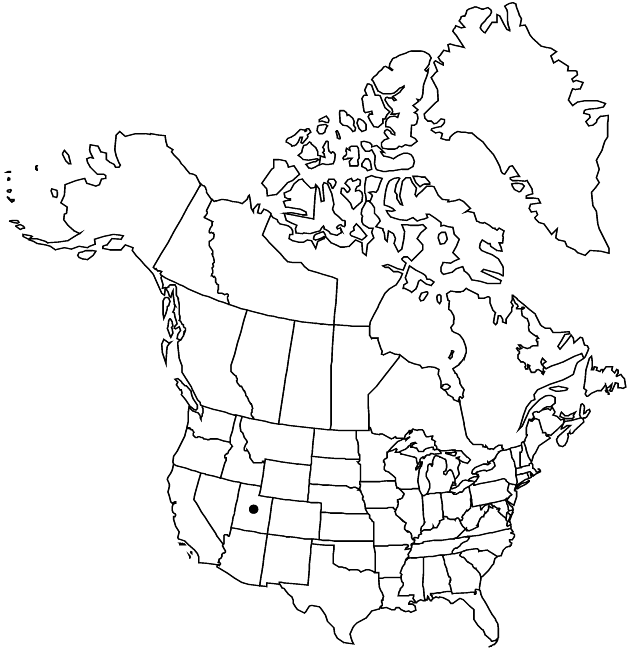Difference between revisions of "Gutierrezia petradoria"
Great Basin Naturalist 43: 288. 1983.
FNA>Volume Importer |
imported>Volume Importer |
||
| (6 intermediate revisions by 2 users not shown) | |||
| Line 8: | Line 8: | ||
}} | }} | ||
|common_names=Goldenrod snakeweed | |common_names=Goldenrod snakeweed | ||
| − | |basionyms={{Treatment/ID/ | + | |special_status={{Treatment/ID/Special_status |
| + | |code=E | ||
| + | |label=Endemic | ||
| + | }} | ||
| + | |basionyms={{Treatment/ID/Basionym | ||
|name=Xanthocephalum petradoria | |name=Xanthocephalum petradoria | ||
|authority=S. L. Welsh & S. Goodrich | |authority=S. L. Welsh & S. Goodrich | ||
| + | |rank=species | ||
| + | |publication_title=Brittonia | ||
| + | |publication_place=33: 301. 1981 | ||
}} | }} | ||
|synonyms= | |synonyms= | ||
| Line 27: | Line 34: | ||
|elevation=1800–2700 m | |elevation=1800–2700 m | ||
|distribution=Utah. | |distribution=Utah. | ||
| − | |discussion=<p>Gutierrezia petradoria is distinctive, especially in its herbaceous form. The basal leaves are persistent, and the relatively large ray corollas are showy.</p> | + | |discussion=<p><i>Gutierrezia petradoria</i> is distinctive, especially in its herbaceous form. The basal leaves are persistent, and the relatively large ray corollas are showy.</p> |
|tables= | |tables= | ||
|references= | |references= | ||
| Line 36: | Line 43: | ||
-->{{#Taxon: | -->{{#Taxon: | ||
name=Gutierrezia petradoria | name=Gutierrezia petradoria | ||
| − | |||
|authority=(S. L. Welsh & S. Goodrich) S. L. Welsh | |authority=(S. L. Welsh & S. Goodrich) S. L. Welsh | ||
|rank=species | |rank=species | ||
| Line 46: | Line 52: | ||
|habitat=Rocky ridges, crevices, and slopes, quartzite or limestone substrate, sagebrush, mountain mahogany, white fir communities | |habitat=Rocky ridges, crevices, and slopes, quartzite or limestone substrate, sagebrush, mountain mahogany, white fir communities | ||
|illustrator=Yevonn Wilson-Ramsey | |illustrator=Yevonn Wilson-Ramsey | ||
| + | |illustration copyright=Flora of North America Association | ||
|elevation=1800–2700 m | |elevation=1800–2700 m | ||
|distribution=Utah. | |distribution=Utah. | ||
| Line 51: | Line 58: | ||
|publication title=Great Basin Naturalist | |publication title=Great Basin Naturalist | ||
|publication year=1983 | |publication year=1983 | ||
| − | |special status= | + | |special status=Endemic |
| − | |source xml=https:// | + | |source xml=https://bitbucket.org/aafc-mbb/fna-data-curation/src/2e0870ddd59836b60bcf96646a41e87ea5a5943a/coarse_grained_fna_xml/V19-20-21/V20_179.xml |
|tribe=Asteraceae tribe Astereae | |tribe=Asteraceae tribe Astereae | ||
|genus=Gutierrezia | |genus=Gutierrezia | ||
Latest revision as of 20:01, 5 November 2020
Perennials, 10–40 cm. Stems minutely scabro-hirtellous. Leaves: basal persistent at flowering; cauline blades mostly 3- or 5-nerved, linear-spatulate to linear, proximal 1–3(–4) mm wide, narrower distally. Heads borne singly or (2–4) in loose arrays. Involucres broadly turbinate to obconic, 4–7 mm diam. Phyllary apices flat, ± swollen. Ray florets (4–)5–10; corollas yellow, 5–8(–10) mm. Disc florets 15–23 (bisexual and fertile or functionally staminate). Cypselae 1.5–3(–3.5) mm, faces without oil cavities, loosely strigose (hair apices acute); pappi of 1–2 series of scales (0.5–)1–2.2 mm. 2n = 8.
Phenology: Flowering Aug–Oct(–Nov).
Habitat: Rocky ridges, crevices, and slopes, quartzite or limestone substrate, sagebrush, mountain mahogany, white fir communities
Elevation: 1800–2700 m
Discussion
Gutierrezia petradoria is distinctive, especially in its herbaceous form. The basal leaves are persistent, and the relatively large ray corollas are showy.
Selected References
None.
